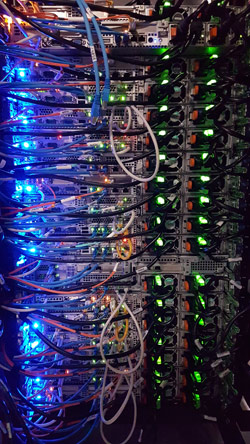You’re sitting at your computer, leaned in nice and close to the monitor and your fingers are furiously tapping away at the keys. Maybe you have some music on to drown out the sound of your coworkers chatter but if anything, you are focused. You’ve got an important project to finish writing up so that you can upload it to the company server for your manager to access from home within the next hour. As you pound the keys and finally, you finish, you hit the save button. Oh, but there’s a problem. You’ve managed to save the file to your personal computer but your servers are down. This means you can’t upload it for your boss to read it right away. Is this the end of the world? Not really. Your file is too big to e-mail so you’ve got to find another way to get that information to your manager, five seconds ago.
 This can be a common scene. While servers make our lives easier they don’t always work when we want them to. They are electronic so they don’t have feelings (yet) and they don’t fail right when we have a huge project do because they’re jerks. They fail because of a physical or logistical error. Regular maintenance can help avoid these problems but they aren’t omnipotent.
This can be a common scene. While servers make our lives easier they don’t always work when we want them to. They are electronic so they don’t have feelings (yet) and they don’t fail right when we have a huge project do because they’re jerks. They fail because of a physical or logistical error. Regular maintenance can help avoid these problems but they aren’t omnipotent.
There are a variety of server set ups in the world that companies use, one of which is the Dell PowerEdge RAID server. They are a very popular network solution and data storage arrangement for all sizes of businesses. While RAID itself can come in many configurations such as 0, 1, 5, 6, 10 the most popular set up for Dell PowerEdge RAID is RAID 5. If you’re someone who accesses the server and doesn’t maintain it this information is probably like someone trying to teach you how to bungee jump when you’re afraid of falling. It’s not impossible to do or understand, just incredibly difficult.
But what does it all mean? Why do we care what the common use of the Dell PowerEdge RAID server is? Why is 5 such an important number for a RAID setup? Well, if you are the person who maintains the server or has the most interaction with it this information is important because it will help you identify what potential issues are going to be.
Like all technology Dell PowerEdge RAID are prone to specific issues. This is the blessing in disguise when you use a system created by one developer. If you know what issues are more likely to plague your system you will know how to circumvent them. These servers are more susceptible to the following issues: Drive Drops, Single Hard Drive Failure and Reconstruction Failures. How is this knowledge going to help you? Well, if you have to send your hard discs away for repair you will be aware of what sort of issues the technicians will come back at you with. This will also help you if you are looking for a company to help you recover your data. You will know what sort of troubles they should have experience with to ensure that you will get the best assistance.
You want a company that deals with Dell PowerEdge RAID on a regular basis. If they have common problems, they have common solutions. These technicians will be able to spot the issue and deploy the repair faster than those who have zero experience with the configuration. This will help you save money and help you save time. The more experienced the better as it will help you out in the long run and let you get back to work sooner rather than later.
